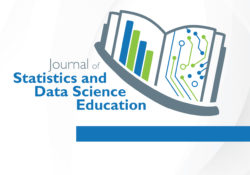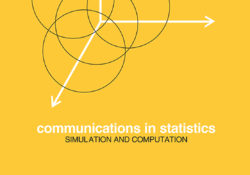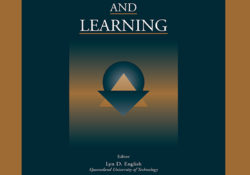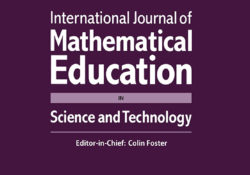
tandfonline.com har udgivet en rapport under søgningen „Teacher Education Mathematics‟: ABSTRACT ABSTRACT The CASE project (Case-based Approaches to Statistics Education; see www.mas.ncl.ac.uk/∼nlf8/innovation) was established to investigate how the use of real-life, discipline-specific case study material in Statistics service courses could improve student engagement, motivation, and confidence. Ultimately, the project aims to promote deep learning of course material, with students from other disciplines being equipped with the skills to undertake independent quantitative analyses (for example, in their final year dissertations). In this article, I describe the case-based materials and associated activities, developed as part of this project, for first year Business undergraduates taking a compulsory course in quantitative methods. I also attempt to evaluate the success of the CASE project through a trial in which a randomly selected subgroup of students… Continue Reading →
Like this:
Like Loading...
eric.ed.gov har udgivet: This study investigated whether two different versions of an online professional development course produced different impacts on the intended outcomes of the course. Variations of an online course for middle school algebra teachers were created for two experimental conditions. One was an actively facilitated course with asynchronous peer interactions among participants. The second was a self-paced condition, in which neither active facilitation nor peer interactions were available. Both conditions showed significant impact on teachers‛ mathematical understanding, pedagogical beliefs, and instructional practices. Surprisingly, the positive outcomes were comparable for both conditions. Further research is needed to determine whether this finding is limited to self-selected teachers, the specifics of this online course, or other factors that limit generalizability. (Contains 6 tables.) Link til kilde
Like this:
Like Loading...
eric.ed.gov har udgivet: Research examined how three middle school teachers included students with disabilities in their general education classrooms. Purposive sampling was used to select a sixth grade science teacher, seventh grade social studies teacher, and eighth grade math teacher whose classrooms were identified as exemplifying the characteristics of inclusive settings. Each participant had at least six years of teaching experience. The qualitative techniques of interviews, observations, and document analyses were utilized to tell the stories of the three teachers. The specific themes and areas that emerged from the data were preparation, attitudes, and expectations; planning time, collaboration and in-class supports; and instructional strategies. Data revealed that all participants had little pre-service preparation specific to working with students with disabilities and varying levels of in-class supports, but all had positive… Continue Reading →
Like this:
Like Loading...
eric.ed.gov har udgivet: This case study focuses on teachers‛ actions during problem-solving lessons. The aim of this study was to find out how teachers guide students during mathematics problem-solving lessons: What kinds of questions do teachers ask? How do students arrive at solutions to problems? The dataset contained videotaped fourthgrade math lessons in which students solved a mathematical problem. The research reveals that teachers can guide students in numerous ways and possibly in ways that prevent students from searching for their own solution strategies. For this reason, problem-solving exercises alone are not sufficient for teaching problem solving for students, teachers must also be instructed in how to properly guide students. In the conclusion section, we discuss the types of questions that enable teachers to promote active learning in students, which… Continue Reading →
Like this:
Like Loading...
tandfonline.com har udgivet en rapport under søgningen „Teacher Education Mathematics‟: ABSTRACT ABSTRACT Two classes of methods properly account for clustering of data: design-based methods and model-based methods. Estimates from both methods have been shown to be approximately equal with large samples. However, both classes are known to produce biased standard error estimates with small samples. This paper compares the bias of standard errors and statistical power of marginal effects for generalized estimating equations (a design-based method) and generalized/linear mixed effects models (model-based methods) with small sample sizes via a simulation study. Provided that the distributional assumptions are met, model-based methods produced the least-biased standard error estimates and greater relative statistical power. Link til kilde
Like this:
Like Loading...
eric.ed.gov har udgivet: This study used a systematic process modeled after the What Works Clearinghouse (WWC) study review process to answer the question: What does the causal research say are effective math professional development interventions for K-12 teachers aimed at improving student achievement? The study identified and screened 910 research studies in a comprehensive literature search for effectiveness studies of math professional development approaches. (See appendix A for details of the search, screening, and review process.) Of these 910 studies, 643 examined professional development approaches related to math in grades K-12 and were conducted in the United States. Of the 643 studies, 32 focused primarily on math professional development provided to teachers and used a research design for examining effectiveness (see appendix B for a list of the 32 studies).… Continue Reading →
Like this:
Like Loading...
tandfonline.com har udgivet en rapport under søgningen „Teacher Education Mathematics‟: ABSTRACT ABSTRACT The aim of the study is to investigate and compare approaches to algebra in the Estonian, Finnish, and Swedish national core curricula (Grades 1–9). Despite the similarities in the school systems of these neighboring countries, the analysis reveals three quite different curricular approaches. The Estonian approach shows influences of the Russian Davydov School. The Finnish approach to some extent resembles the traditional one whereby algebra is addressed first at the lower secondary level and then in a formal manner. However, there are also characteristics typical of the functional view, which dominates the Swedish curriculum. Here, as opposed to the documents from the other two countries, a transition to more formal sophisticated methods at the secondary level is not… Continue Reading →
Like this:
Like Loading...
tandfonline.com har udgivet en rapport under søgningen „Teacher Education Mathematics‟: Abstract Formulae display:?Mathematical formulae have been encoded as MathML and are displayed in this HTML version using MathJax in order to improve their display. Uncheck the box to turn MathJax off. This feature requires Javascript. Click on a formula to zoom. Theories of self-efficacy and approaches to learning are well-established in the psychology of learning. However, studies on relationships between the primary constructs on which these theories are developed are rarely reported in mathematics education research. Thus, the purpose of the current study is to provide empirical evidence for a potential causal relationship between perceived self-efficacy and approaches to learning. The present study adopts a cross-sectional survey research design that includes 195 engineering students enrolled on a first-year introductory calculus… Continue Reading →
Like this:
Like Loading...
tandfonline.com har udgivet en rapport under søgningen „Teacher Education Mathematics‟: ABSTRACT ABSTRACT Most often, flipped classroom approaches in science and mathematics classrooms follow a traditional approach to teaching, where students receive direct instruction as homework and have to apply and deepen their knowledge in a follow-up lesson. Little is known about the arrangements of in-class and out-of-class phases fostering learning through inquiry in flipped classroom scenarios. To support teachers’ lesson planning practices, we developed a design heuristic for flipped classroom scenarios based on the 5E inquiry model. We implemented this design heuristic in an online professional development course for secondary mathematics teachers and collected 18 lesson plans. To explore how participating teachers adopted the design heuristic in their lesson plans, we conducted a document analysis on our data. We identified… Continue Reading →
Like this:
Like Loading...
eric.ed.gov har udgivet: In Yucatec Maya middle schools in the Yucatán, math scores are low and drop out rates are high. Although addressing larger social and economic causes may ameliorate these issues, improving math instruction may be a more immediate, feasible approach. This ethnographic, mixed-methods study explores community approaches to problem-solving relevant to middle school math classrooms. Findings indicate: (1) community members possess specialized, practical mathematical expertise that is overlooked in the research around rural, impoverished students, and (2) formal math instruction misses opportunities to capitalize upon cultural approaches involving autonomy and improvisational expertise. Results are relevant for curriculum reform in the US, México, and beyond. [For the complete proceedings, see ED583608.] Link til kilde
Like this:
Like Loading...




